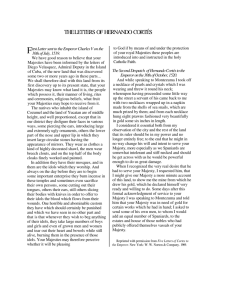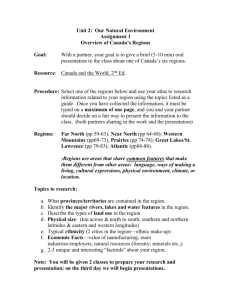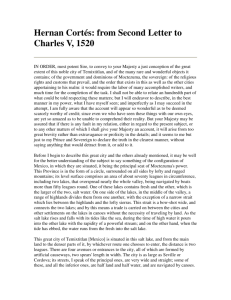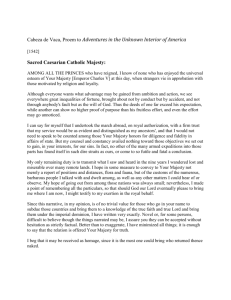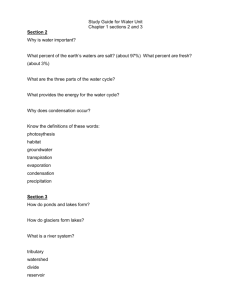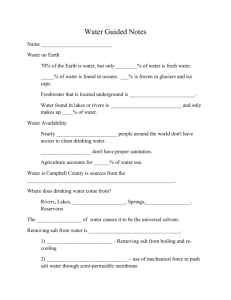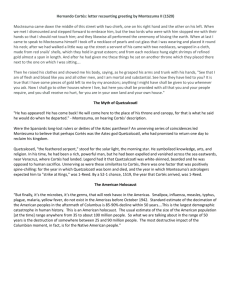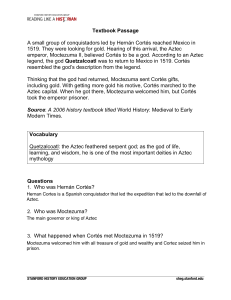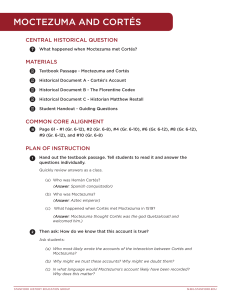Hernan Cortés primary sources
advertisement
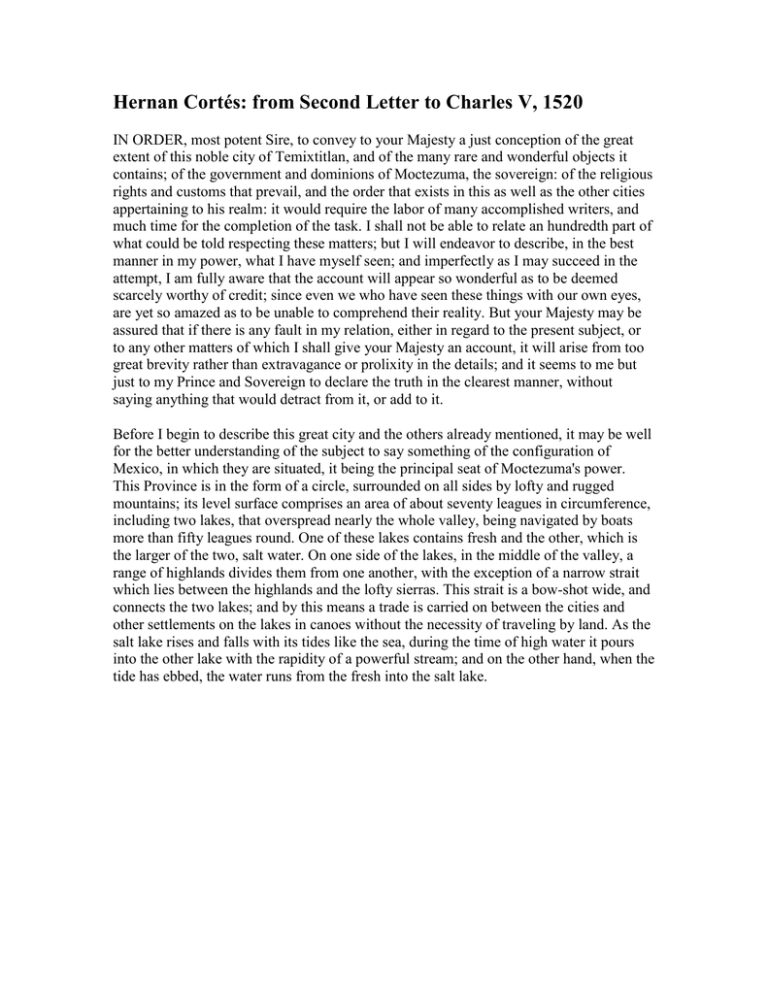
Hernan Cortés: from Second Letter to Charles V, 1520 IN ORDER, most potent Sire, to convey to your Majesty a just conception of the great extent of this noble city of Temixtitlan, and of the many rare and wonderful objects it contains; of the government and dominions of Moctezuma, the sovereign: of the religious rights and customs that prevail, and the order that exists in this as well as the other cities appertaining to his realm: it would require the labor of many accomplished writers, and much time for the completion of the task. I shall not be able to relate an hundredth part of what could be told respecting these matters; but I will endeavor to describe, in the best manner in my power, what I have myself seen; and imperfectly as I may succeed in the attempt, I am fully aware that the account will appear so wonderful as to be deemed scarcely worthy of credit; since even we who have seen these things with our own eyes, are yet so amazed as to be unable to comprehend their reality. But your Majesty may be assured that if there is any fault in my relation, either in regard to the present subject, or to any other matters of which I shall give your Majesty an account, it will arise from too great brevity rather than extravagance or prolixity in the details; and it seems to me but just to my Prince and Sovereign to declare the truth in the clearest manner, without saying anything that would detract from it, or add to it. Before I begin to describe this great city and the others already mentioned, it may be well for the better understanding of the subject to say something of the configuration of Mexico, in which they are situated, it being the principal seat of Moctezuma's power. This Province is in the form of a circle, surrounded on all sides by lofty and rugged mountains; its level surface comprises an area of about seventy leagues in circumference, including two lakes, that overspread nearly the whole valley, being navigated by boats more than fifty leagues round. One of these lakes contains fresh and the other, which is the larger of the two, salt water. On one side of the lakes, in the middle of the valley, a range of highlands divides them from one another, with the exception of a narrow strait which lies between the highlands and the lofty sierras. This strait is a bow-shot wide, and connects the two lakes; and by this means a trade is carried on between the cities and other settlements on the lakes in canoes without the necessity of traveling by land. As the salt lake rises and falls with its tides like the sea, during the time of high water it pours into the other lake with the rapidity of a powerful stream; and on the other hand, when the tide has ebbed, the water runs from the fresh into the salt lake. Hernan Cortés: from Second Letter to Charles V, 1520 This city (Temixtitlan) has many public squares, in which are situated the markets and other places for buying and selling. There is one square twice as large as that of the city of Salamanca, surrounded by porticoes, where are daily assembled more than sixty thousand souls, engaged in buying and selling; and where are found all kinds of merchandise that the world affords, embracing the necessaries of life, as for instance articles of food, as well as jewels of gold and silver, lead, brass, copper, tin, precious stones, bones, shells, snails, and feathers. There are also exposed for sale wrought and unwrought stone, bricks burnt and unburnt, timber hewn and unhewn, of different sorts. There is a street for game, where every variety of birds in the country are sold, as fowls, partridges, quails, wild ducks, fly-catchers, widgeons, turtledoves, pigeons, reed-birds, parrots, sparrows, eagles, hawks, owls, and kestrels; they sell likewise the skins of some birds of prey, with their feathers, head, beak, and claws. There are also sold rabbits, hares, deer, and little dogs [i.e., the chihuahua], which are raised for eating. There is also an herb street, where may be obtained all sorts of roots and medicinal herbs that the country affords. There are apothecaries' shops, where prepared medicines, liquids, ointments, and plasters are sold; barbers' shops, where they wash and shave the head; and restaurateurs, that furnish food and drink at a certain price. There is also a class of men like those called in Castile porters, for carrying burdens. Wood and coal are seen in abundance, and braziers of earthenware for burning coals; mats of various kinds for beds, others of a lighter sort for seats, and for halls and bedrooms. There are all kinds of green vegetables, especially onions, leeks, garlic, watercresses, nasturtium, borage, sorrel, artichokes, and golden thistle; fruits also of numerous descriptions, amongst which are cherries and plums, similar to those in Spain; honey and wax from bees, and from the stalks of maize, which are as sweet as the sugar-cane; honey is also extracted from the plant called maguey, which is superior to sweet or new wine; from the same plant they extract sugar and wine, which they also sell. Different kinds of cotton thread of all colors in skeins are exposed for sale in one quarter of the market, which has the appearance of the silk-market at Granada, although the former is supplied more abundantly. Painters' colors, as numerous as can be found in Spain, and as fine shades; deerskins dressed and undressed, dyed different colors; earthen-ware of a large size and excellent quality; large and small jars, jugs, pots, bricks, and endless variety of vessels, all made of fine clay, and all or most of them glazed and painted; maize or Indian corn, in the grain and in the form of bread, preferred in the grain for its flavor to that of the other islands and terra-firma; patés of birds and fish; great quantities of fish---fresh, salt, cooked and uncooked; the eggs of hens, geese, and of all the other birds I have mentioned, in great abundance, and cakes made of eggs; finally, everything that can be found throughout the whole country is sold in the markets, comprising articles so numerous that to avoid prolixity, and because their names are not retained in my memory, or are unknown to me, I shall not attempt to enumerate them. Hernan Cortés: from Second Letter to Charles V, 1520 I said everything to them I could to divert them from their idolatries, and draw them to a knowledge of God our Lord. Moctezuma replied, the others assenting to what he said, That they had already informed me they were not the aborigines of the country, but that their ancestors had emigrated to it many years ago; and they fully believed that after so long an absence from their native land, they might have fallen into some errors; that I having more recently arrived must know better than themselves what they ought to believe; and that if I would instruct them in these matters, and make them understand the true faith, they would follow my directions, as being for the best. Afterwards, Moctezuma and many of the principal citizens remained with me until I had removed the idols, purified the chapels, and placed the images in them, manifesting apparent pleasure; and I forbade them sacrificing human beings to their idols as they had been accustomed to do; because, besides being abhorrent in the sight of God, your sacred Majesty had prohibited it by law, and commanded to put to death whoever should take the life of another. Thus, from that time, they refrained from the practice, and during the whole period of my abode in that city, they were never seen to kill or sacrifice a human being. The figures of the idols in which these people believe surpass in stature a person of more than ordinary size; some of them are composed of a mass of seeds and leguminous plants, such as are used for food, ground and mixed together, and kneaded with the blood of human hearts taken from the breasts of living persons, from which a paste is formed in a sufficient quantity to form large statues. When these are completed they make them offerings of the hearts of other victims, which they sacrifice to them, and besmear their faces with the blood. For everything they have an idol, consecrated by the use of the nations that in ancient times honored the same gods. Thus they have an idol that they petition for victory in war; another for success in their labors; and so for everything in which they seek or desire prosperity, they have their idols, which they honor and serve.
